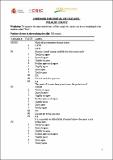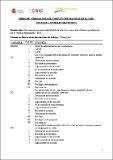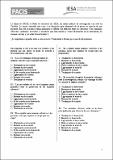Por favor, use este identificador para citar o enlazar a este item:
http://hdl.handle.net/10261/309698COMPARTIR / EXPORTAR:
 SHARE
BASE SHARE
BASE
|
|
| Visualizar otros formatos: MARC | Dublin Core | RDF | ORE | MODS | METS | DIDL | DATACITE | |

| Título: | Encuesta sobre orientación en valores hacia la fauna silvestre (WVO) 2017 |
Otros títulos: | Wildlife Value Orientation Survey (WVO) 2017 | Autor: | Garrido Fernández, Fernando E.; Villafuerte, Rafael CSIC ORCID; Castro, Francisca CSIC ORCID; Moyano Estrada, Eduardo CSIC ORCID | Palabras clave: | Species reintroduction Environmental policies Conservation measures Políticas ambientales Medidas conservación Reintroducción especies |
Fecha de publicación: | 25-may-2023 | Editor: | DIGITAL.CSIC | Citación: | Garrido Fernández, Fernando E.; Villafuerte, Rafael; Castro, Francisca; Moyano Estrada, Eduardo; 2023; Encuesta sobre orientación en valores hacia la fauna silvestre (WVO) 2017 [Dataset]; DIGITAL.CSIC; https://doi.org/10.20350/digitalCSIC/15296 | Resumen: | [EN] The objective of this study is to help understand attitudes towards issues such as the hunting acceptability, the control of species that produce damage, or measures to support the conservation of endangered animals. The survey is carried out using de Citizen Panel for Social Research in Andalusia (PACIS). This panel is an instrument implemented by IESA-CSIC for the collection of quality information in research for scientific purposes or improve public administration. The 4th wave of PACIS, carried out between May and June,2017, focused on opinions and attitudes about wildlife. A total of 750 people has participated in this survey. The results show panelists preferences for different measures oriented to protect the environment, provide data on the responsibility that citizens attribute to farmers and ranchers when implementing conservation measures in order to protect endangered species. [ES] El objetivo de este estudio es ayudar a comprender las actitudes hacia temas como la aceptabilidad de la caza, el control de especies que provocan daños, o medidas de apoyo a la conservación de animales amenazados. La encuesta se lleva a cabo empleando el Panel Ciudadano para la Investigación Social en Andalucía (PACIS). Este panel es una herramienta puesta en marcha por el IESA-CSIC para la recogida de información de calidad en investigaciones con fines científicos o de mejora de la gestión pública. La 4ª Ola del PACIS, realizada durante mayo y junio de 2017, se centró en las opiniones y actitudes sobre la fauna silvestre. En esta encuesta han participado 750 personas. En los resultados se muestra las preferencias de los panelistas por distintas medidas orientadas a proteger el medio ambiente, se aportan datos sobre la responsabilidad que los ciudadanos atribuyen a agricultores y ganaderos a la hora de implementar medidas de conservación con el fin de proteger especies amenazadas. |
Descripción: | [Description of methods used for collection/generation of data] PACIS is a survey panel. The owner of this panel is IESA-CSIC, a public scientific research center belonging to the Spanish National Research Council. The information obtained both at the time of registration and in the successive questionnaires answered by its members is protected by Law 12/89, which regulates statistical secret for public administrations, and can only be processed and disseminated in numerical and aggregate form, in order to guarantee the anonymity of the interviewees. The persons registered in PACIS are included in an automated file comprising contact data and basic classification variables, the purpose of which is to carry out scientific opinion surveys. This file, which is owned by IESA-CSIC, is not shared in any case with third parties, and IESA-CSIC applies appropriate security measures to comply with the Organic Law 3/2018, of December 5, on Personal Data Protection and guarantee of digital rights. Any person registered in PACIS can exercise their rights of access, rectification, cancellation and opposition by sending an email to agpd@pacis.es In the surveys carried out, only the personal information necessary to guarantee the quality of the research is collected. Once the data collection has been completed, the results matrix is anonymized and the data of the persons registered in the PACIS file is unlinked to their answers to the questionnaires. The questionnaires comply with the different specific quality standards in survey research such as UNE ISO-20252, ICC/ESOMAR, and specific Accessibility and Usability standards in digital formats such as UNE 139803 and WCAG 1.0. • UNIVERSE: People 18 years or older living in Andalusia. • FRAMEWORK: PACIS citizen panel. • SAMPLE SIZE: 751 interviews. • DATA COLLECTION: The sample has been selected among people belonging to PACIS. They have been contacted by e-mail, SMS and telephone and have filled the questionnaire by Internet (on a website) or by telephone interview. Some members were contacted through several channels. To achieve the sample of 750 interviews, 1.825 PACIS members were selected. • SAMPLE TYPE: Stratified selection by age group and sex of PACIS members, with the strata being proportional to the Andalusian population over 18 years of age. • AVERAGE INTERVIEW TIME: 19 minutes. • MAXIMUM SAMPLING ERROR: ± 3,6% | URI: | http://hdl.handle.net/10261/309698 | DOI: | https://doi.org/10.20350/digitalCSIC/15296 | Referencias: | Garrido Fernández, Fernando E.; Castro, Francisca; Villafuerte, Rafael. Control hunting of wild animals: health, money or pleisure?. European Journal of Wildlife Research 63: 95 (2017). http://dx.doi.org/10.1007/s10344-017-1154-x . http://hdl.handle.net/10261/212355 |
| Aparece en las colecciones: | (IESA) Conjuntos de datos |
Ficheros en este ítem:
| Fichero | Descripción | Tamaño | Formato | |
|---|---|---|---|---|
| Wildlife_Dataset.csv | 135,81 kB | csv | Visualizar/Abrir | |
| Wildlife_Dataset.sav | 92,17 kB | sav | Visualizar/Abrir | |
| WILDLIFE_Codebook_EN.pdf | 525,77 kB | Adobe PDF |  Visualizar/Abrir | |
| WILDLIFE_Codebook_SP.pdf | 528,6 kB | Adobe PDF |  Visualizar/Abrir | |
| Wildlife_Survey.pdf | 65,46 kB | Adobe PDF |  Visualizar/Abrir | |
| WILDLIFE_Readme_EN.pdf | 144,99 kB | Adobe PDF |  Visualizar/Abrir | |
| WILDLIFE_Readme_SP.pdf | 87,73 kB | Adobe PDF |  Visualizar/Abrir |
CORE Recommender
Page view(s)
144
checked on 27-abr-2024
Download(s)
117
checked on 27-abr-2024
Google ScholarTM
Check
Altmetric
Altmetric
NOTA: Los ítems de Digital.CSIC están protegidos por copyright, con todos los derechos reservados, a menos que se indique lo contrario.


